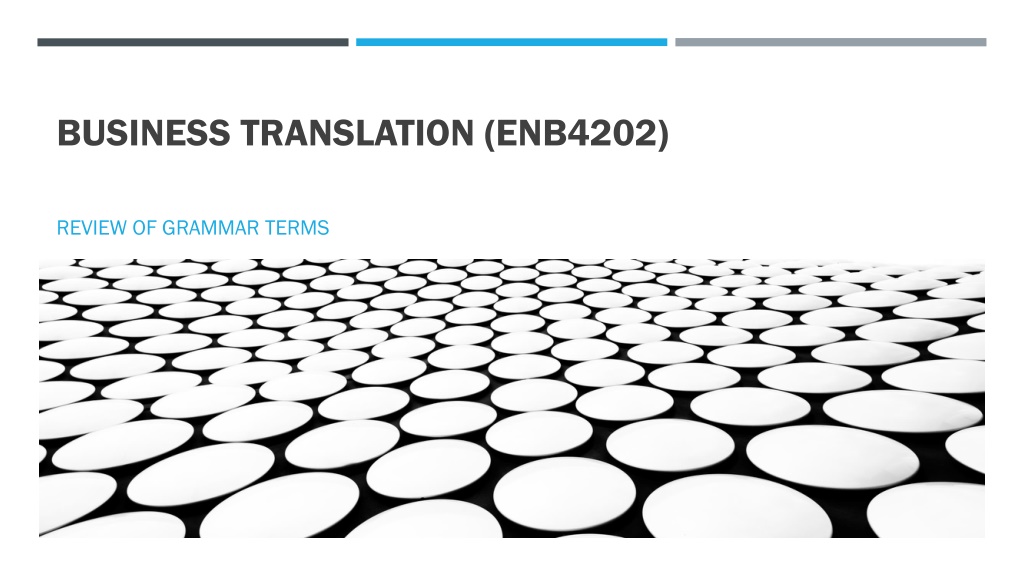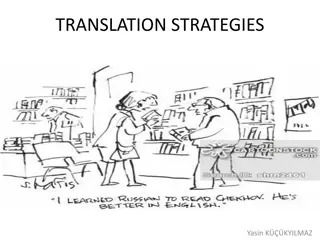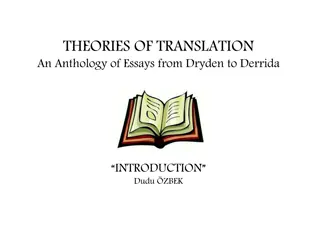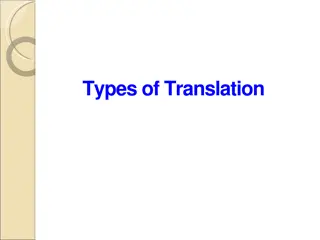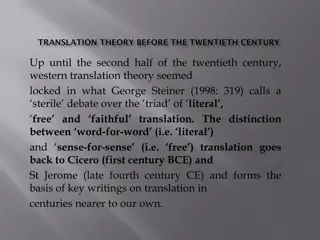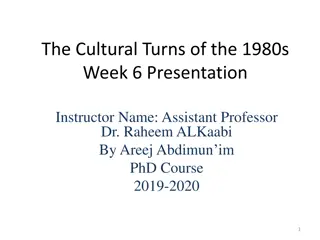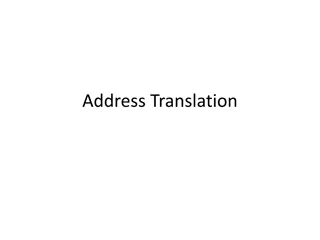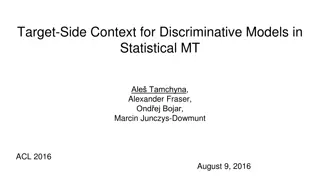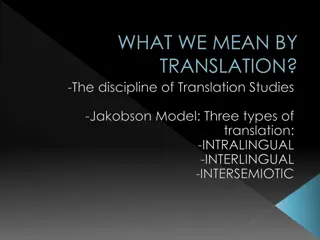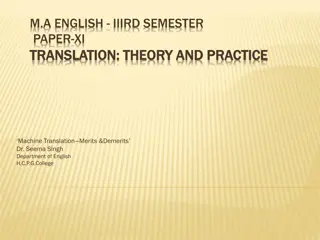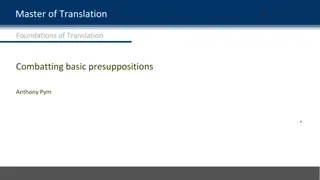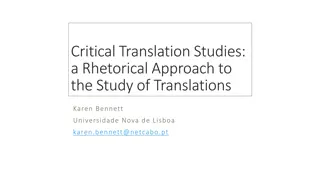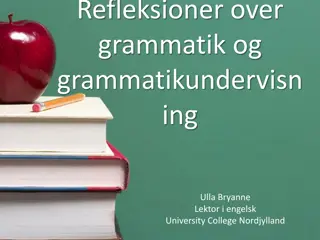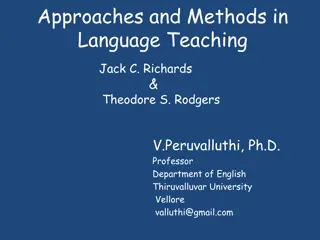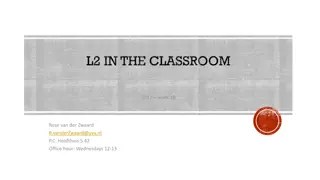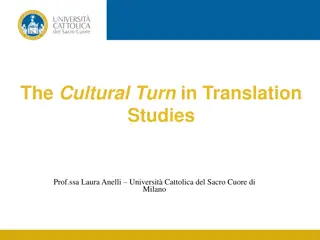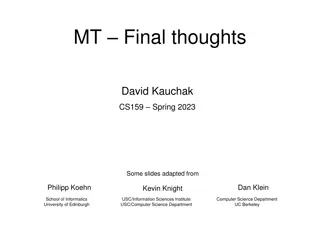Understanding Grammar Terms in Business Translation (ENB4202)
Explore key grammar terms such as action verb, adjective, adverb, article, clause, coordinating conjunction, dependent clause, gerund, linking verb, noun, noun phrase, object, phrase, preposition, pronoun, and subject in the context of business translation. Learn their definitions, functions, and examples to enhance your language skills.
Download Presentation

Please find below an Image/Link to download the presentation.
The content on the website is provided AS IS for your information and personal use only. It may not be sold, licensed, or shared on other websites without obtaining consent from the author. Download presentation by click this link. If you encounter any issues during the download, it is possible that the publisher has removed the file from their server.
E N D
Presentation Transcript
BUSINESS TRANSLATION (ENB4202) REVIEW OF GRAMMAR TERMS
GRAMMAR TERMS DEFINITIONS/FUNCTION EXAMPLES Action verb Action verb : Also see the entries for Linking verb and Verb Adjective Adjective a verb that express an action such as hit, live, lose, speak, go, or come a word that describes a noun or pronoun I lost lost my keys. He lives lives in Rome now. I have a new new neighbor named Eva. Eva has a nice nice smile. She is friendly. friendly. The actors talked fast It was really really difficult to understand them. I listened very very carefully carefully. I m going to watch the same movie tomorrow tomorrow. Meet me here here at 9:00. There is a a caf on Green Street. The The caf is called Java s. It is an an interesting place. This is my book. This is my book. (independent clause) .because it was late. because it was late. (dependent clause) It is my birthday, , so so I want to celebrate. Adverb Adverb a word that describes a verb, an adjective, another adverb, or a complete sentence, often to tell how, when, or where fast. Article Article the word a, an, or the, used to introduce a noun Clause Clause a group of related words that has a subject and verb Coordinating Coordinating conjunction conjunction a word that connects equal elements in a sentence (for, and, nor, but, or, yet, and so) , but , but
EXAMPLES DEFINITIONS/FUNCTION GRAMMAR TERMS Dependent Dependent clause clause a clause that cannot be a complete sentence a verb ending in ing that is used as a noun a clause that is, or could be, a complete sentence a verb that connects the subject to information about the subject a word that names a person, place, or thing and that can be used as a subject or an object After I got up After I got up because it was late. because it was late. Playing Playing is fun. I am sad about leaving. I took a shower. I took a shower. After I got up, I took a shower. I took a shower. She is is in a band. I am am his boss. I have a roommate roommate at school. His name name is Mark Mark. He is from Hong Hong Kong Mark Mark and I like the same music He lives in that old house on that old house on the corner. corner. I m reading a really good book. a really good book. Mark is always losing things Today he lost his keys. his keys. His girlfriends found them I saw mine mine on the table. Gerund Gerund leaving. Independent clause Independent clause Linking verb: Linking verb: Also see the entries for Action Verb and Verb Noun Noun Kong. music. Noun phrase Noun phrase a group of words ending with a noun that belong together in meaning the Object Object a noun, noun phrase, object pronoun, or possessive pronoun that receives the action of certain verbs things. them.
DEFINITIONS/FUNCTION EXAMPLES GRAMMAR TERMS Phrase Phrase a group of related words that does not have both both a subject and a verb a word that shows direction, location, ownership, and so on. I had a frightening experience a frightening experience. It happened a few days ago a few days ago. I went into into my room and looked under the bed. Juan is from from Guadalupe in in Mexico. The train left at at noon noon. Hundreds of people were on on it. Ed knew where where the pen was. He He had hidden it it. Mark Mark rarely loses his keys. His His sister sister lives in Boston. She She has a nice house. When When it s hot, we go to the beach. He couldn t find the file because lost it. Davina plays plays the guitar and sings. He feels feels happy today. She enjoyed enjoyed the opera. Preposition Preposition under Prepositional Prepositional phrase phrase a preposition plus a noun, pronoun, or gerund a word that replaces a noun Pronoun Pronoun Subject Subject a noun, noun phrase, or subject pronoun that tells who or what the sentence is about a word or phrase that introduces a dependent clause Subordinating conjunction Subordinating conjunction ( subordinator ) ( subordinator ) because he Verb Verb a word or a group of words that expresses an action, feeling, or state
BUSINESS TRANSLATION (ENB4202) RECOGNIZING SENTENCES OR NON-SENTENCES
Read each group of words and write Read each group of words and write S (sentence) S (sentence) or or NS (non NS (non- -sentence) sentence) NS ______1. Is very hot today. S ______2. It is raining today. NS ______3. My new classmate from Brazil. S ______4. He speaks three languages fluently. NS ______5. Is very competitive. S ______6. Hurry up, please. S ______7. He wants to start his own business. S ______8. He isn t married.
Read each group of words and write Read each group of words and write S (sentence) S (sentence) or or NS (non NS (non- -sentence) sentence) NS ______9. Enjoys music, especially jazz. S ______10. Don t send text messages in class. NS ______11. The books expensive. S ______12. Go to the course website. NS ______13. When I finish my education. S ______14. He looks mad. S ______15. Who s there? S ______16. I will work for my uncle, when I finish my education.
Correct the Correct the NSs (non NSs (non- -sentences) sentences) NS ______1. Is very hot today. ______3. My new classmate from Brazil. NS ______5. Is very competitive. NS NS ______9. Enjoys music, especially jazz. NS ______11. The books expensive. NS ______13. When I finish my education.
Correct the Correct the NSs (non NSs (non- -sentences) sentences) NS 1. Is very hot today. 1. It is very hot today. NS 3. My new classmate from Brazil. 3. My new classmate is from Brazil. NS 5. Is very competitive. 5. The price is very competitive. NS 9. Enjoys music, especially jazz. 9. She enjoys music, especially jazz. NS 11. The books expensive. 11. The books are expensive. 13. When I finish my education, I will find a job. NS 13. When I finish my education.
BUSINESS TRANSLATION (ENB4202) IDENTIFYING SUBJECTS, VERBS, OBJECTS, COMPLEMENT, AND ADVERBIAL (SVOCA)
SVOCA Nanny Fine is keeping the children very happy. Identify form form of each phrase Nanny Fine is keeping the children very happy. Noun phrase (np) Adjective phrase (adj p) Verb phrase (vp) Noun phrase (np) Identify function function of each phrase (s, v, o, c, a) Nanny Fine is keeping the children very happy. Subject (s) Verb (v) Object (o) Complement (c) Dhamma Bilingualized Bhikkhu P. A. Payutto 2013
SVOCA EXERCISE Identify form form and function function of each phrase of the following sentences (Pron/np) (vp) (np) (adverb phrase) 1. He speaks three languages very fluently. Adverbial (a) Subject (s) Verb (v) Object (o) (prepositional phrase) (vp) (np) 2. My new classmate is from Brazil. Subject (s) Verb (v) Adverbial (a) (np) (vp) (adjective phrase) 3. The price is very competitive. Subject (s) Verb (v) Complement (c)
SVOCA EXERCISE Identify form form and function function of each phrase of the following sentences (adverb phrase) (vp) (adjective phrase) (vp) (np) 4. His job is and well. easy pays Adverbial (a) Verb (v) Subject (s) Complement (c) Verb (v) (vp) (prepositional phrase) (Pron/np) (np) 5. He became Subject (s) a computer programmer at the age of 16. Object (o) Verb (v) Adverbial (a) (prepositional phrase) (np) (vp) (np) (prepositional phrase) 6. On weekends, he plays soccer with his friends. Subject (s) Adverbial (a) Verb (v) Object (o) Adverbial (a)
SVOCA EXERCISE Identify form form and function function of each phrase of the following sentences (adj.phr.) (Pron/np) (vp) (prep. phrase) 7. She was important to me. Adverbial (a) Complement (c) Subject (s) Verb (v) (np) (vp) (np) (pron/ np) 8. My teacher taught me Subject (s) a valuable lesson. Object (o) Verb (v) Object (o) (np) (adj.phr.) (np) (vp) 9. My grandfather seemed unhappy that day. Subject (s) Verb (v) Complement (c) Adverbial (a)
